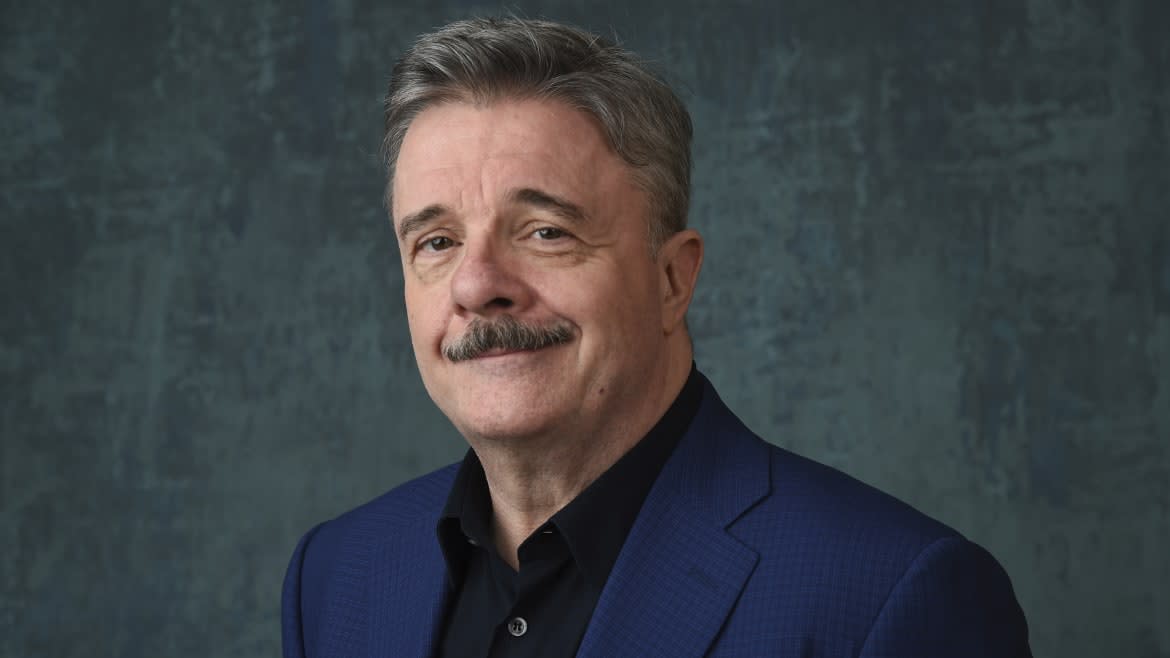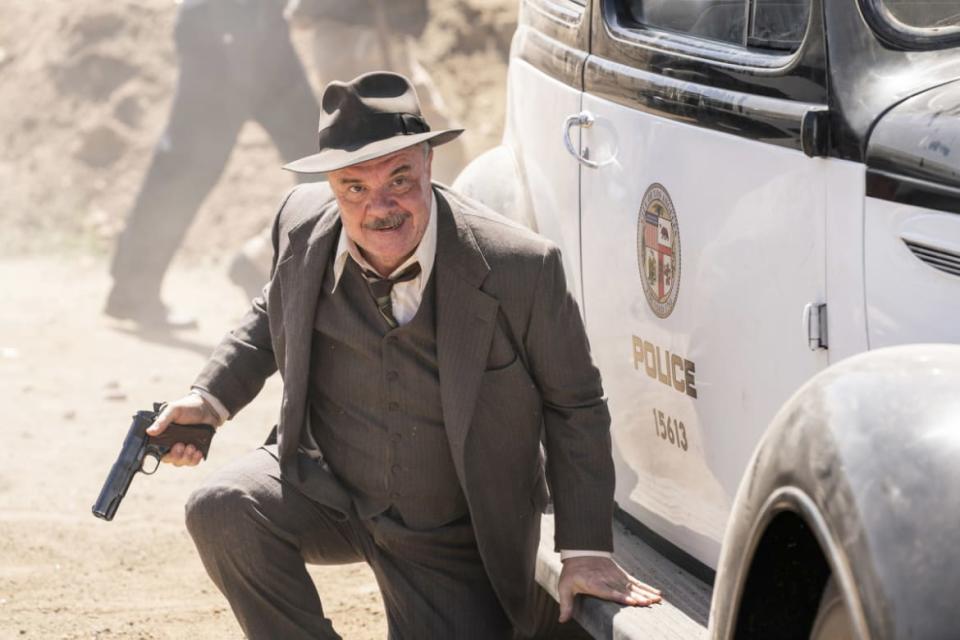Nathan Lane on Why Trump Isn’t Welcome Back in New York City and the Future of Broadway

“It’s without question the most interesting and emotionally complex character I’ve been asked to play in film or television,” offers Nathan Lane.
That’s quite a statement from a man who’s appeared in everything from The Birdcage and The Lion King to The Producers and The People v. O.J. Simpson; then again, the 64-year-old star of stage and screen has never played anyone like Lewis Michener before.
In Penny Dreadful: City of Angels, a spin-off of the macabre Showtime series, Lane’s Michener is a gruff, hard-nosed LAPD detective navigating the treacherous terrain of 1938 Los Angeles, a time filled with racial tension, neo-Nazis, and… shape-shifting demons. Lane describes the show as “Raymond Chandler-meets-Rod Serling” and Michener as “the moral conscience of the show,” a cynical fella who, alongside the force’s first Mexican-American detective, Santiago Vega (Daniel Zovatto), is investigating a series of brutal, otherworldly murders.
“You know, I just feel a tremendous amount of gratitude,” Lane says of the role.
In a wide-ranging conversation, the legendary actor and longtime New Yorker opened up about the COVID-19 pandemic, the future of Broadway, the “nightmare” that is Donald Trump’s presidency, and much more.
Are you in the city?
No, we’re out in the Hamptons battling the overprivileged for toilet paper—and making the best of it.
These are surreal times.
Surreal, and scary. The difficulty is, we don’t know what the ending to this movie is, so the unknown—let alone the unknown to the virus itself. These are challenging times, and one can only hope that we come out of it for the better.
Hugh Jackman on His Closeted Con Artist in ‘Bad Education’ and Turning Down ‘Cats’
Inside the Hilarious Show About a Famous Hollywood Boyfriend’s Sex Doll
It does seem like Cuomo’s doing a pretty good job of handling it, at least since it’s really started spreading.
Yes, he is. If we hadn’t all settled on Grandpa Joe, maybe Cuomo might have a groundswell of support for running [for president], but I liked it particularly today when he just let it go and went off for 11 minutes and ranted about the nightmare that is Donald Trump.
The “nightmare that is Donald Trump.” I’m a New Yorker and of course Trump is too, and it’s strange how he’s been stiffing his own city on necessary supplies, like ventilators.
Not really. He’s squeezed his way in. I don’t think of him as a “real” New Yorker, and I think he’ll have a very hard time when he’s hopefully not re-elected, and if he tries to come back here. I think he’ll have to stay in Florida, which is a fate that he deserves. I don’t think we’d take kindly to him coming back, especially when the New York State prosecutors go after him for the many things that have gone on that they can’t prosecute while he’s president. When the time comes, I think he’s going to be in big trouble—and nothing could make me happier.
I was a child during the AIDS crisis of the ‘80s and ‘90s, but we had family friends who were impacted by it—including one who tragically lost his life. There have been some parallels drawn between then and now.
There’s been some articles about that—the similarities, in terms of a plague like this. Although, when we first heard about AIDS in 1981 in that famous New York Times article, it took years—and Reagan didn’t even use the word “AIDS”—so it was up to the gay community, really, to fight for the drugs, fight to get help, and fight for their own, which spawned groups like ACT UP and the Gay Men’s Health Crisis, as well as activists like Larry Kramer, who really fought to bring attention to it, and bring that attention to the world. The government didn’t want to deal with it at all because they thought it only affected gay people, which didn’t matter to them.
I saw a scary thing today in New York magazine that said with coronavirus, one of the side effects is it may be attacking T cells, not unlike HIV. I don’t know. I’m trying to be realistic but remain positive. Look, the coronavirus is something that we’ve never really experienced before. There may be similarities in trying to stay safe and healthy and avoid it, but it’s its own monster, and they’re still trying to figure it out. We still don’t know.
Right. We’re getting new updates on the nature of the virus seemingly every day.
And we’re not going back to normal. Whatever the new normal is, no one should be rushing back to gather in large groups, and no one should want to do it until we have a vaccine. I certainly understand the issues with the economy, and people needing to work and make a living—it’s a nightmare—but we don’t want people going back too soon, re-infect, and a second wave of this thing could happen in the fall. The unknown that is hanging over our heads is overwhelming, and at a time like this, one hopes that everyone will take it seriously, protect themselves, and look out for each other. It’s about all of us working together to help each other. And this is a time when, in this country, no one can talk to one another politically, no one can listen to one another—it’s tribes—but we all need to work together, no matter what our political affiliations are, to get through this.
You see these press conferences with Trump and one would think that is evidence of what a conman and how emotionally bankrupt he is; a man of no empathy, and a narcissist who really doesn’t care about anybody but himself. Of all people, that he should be in charge at a time like this, is just a catastrophe. You see? I’m hovering between suicidal and homicidal. It creates a pandemic candor, these end-of-the-world fumes, where you say things you probably normally wouldn’t say in polite society!
On a lighter note, what attracted you to Penny Dreadful: City of Angels? You play a grizzled detective, which is pretty unique compared to your other film and television roles.
[Creator] John Logan sent me an email and said, “I wrote this part for you, and I hope you’ll do it.” I was thrilled, delighted, and grateful. We know each other from the theater, and he’s seen a lot of my work in the theater, and I don’t think anyone else in Hollywood would have thought of me for this. He cited having seen me in The Iceman Cometh, and that’s what led to his thinking that Nathan Lane was the person to play this character. So, Eugene O’Neill finally paid off! This is really the culmination of all the work I’ve been doing in the theater in the last 10 years.
You mentioned how John Logan is the only one who would have thought of you for this, and as far as the opportunities for openly gay actors in Hollywood—like to play, say, a grizzled detective—do you feel it’s improved?
I don’t know what goes on behind closed doors. And at this point, I’m at a certain age where I would like to think people are familiar enough with my work to think I could do something like this—especially if they follow my work in the theater. I’m not sure how much homophobia plays in all this, although I’m sure it’s played a part over the years in terms of film work. Also, I didn’t pursue it in the same way I did the theater. The theater, to me, is the ultimate. Terrence McNally used to say, “Theater isn’t a stepping stone” to film and television, it is a great ambition and goal all on its own, and I always felt I would learn more working in the theater as an actor, and it’s the place I’ve always felt the most at home and comfortable, as well as the place that’s afforded me a wide variety of roles. But I’m lucky, and I’ve had the career that I wanted.
With this season, which explores racism against the Mexican-American community as well as the rise of white nationalism with the German American Bund, it seems to certainly be a commentary on things that are going on right now in America.
That’s what makes the writing so rich. John [Logan] had said, when we started, that this was written as a response to what was happening at the country at the moment—and it’s also about the creation of Los Angeles, and the notion that these neighborhoods would melt into one another but then they built these highways that gave greater access and also separated people into the Mexican neighborhood, the black neighborhood, the Jewish neighborhood. It’s an interesting history, and much of it is based on historical fact.

Nathan Lane in Penny Dreadful: City of Angels
I saw you in The Producers on Broadway back in 2001. Is it strange to you how it’s timelier than ever today with this outpouring of white nationalism in the wake of Trump?
Timely… Well, I don’t even know if you could revive it in these ultra-politically-correct days! The whole point of The Producers, why it’s such a brilliant plot, is they’re thinking, What’s the worst thing we can put onstage? and it turns out it’s a musical about Hitler, so it’s deliberately meant to be offensive. When it was done in 1967 it was not that far away from World War II, so obviously it was even more shocking. But when we did the show, it was following a lot of somber British musicals that had come over, and this was a sort of zeitgeist-hit; a return to musical comedy, with an emphasis on the “comedy.” So, I don’t know if you could get away with some of this today! I think Mel [Brooks] has always seen homosexuals as extraterrestrials with a great fashion sense, and when we did it, it was more like commedia dell’arte, but there are a lot of people who are offended by it. You would have to have the right director and cast to pull it off again.
Speaking of Broadway, it’s dark right now. Are you worried about its future given the current shutdown?
I think eventually we will come out of this and it will thrive again, it’s just going to take a long time. The concern is for people who have to make a living—not just the actors, but the crews, the theater staff, everyone who depends on those paychecks. That’s the difficult part, and you hope there will be government assistance for them, since the arts tend to be forgotten or dismissed. But eventually, we will. Once there’s a vaccine, and people feel safe and confident, it will come back, and there will be a lot of plays about quarantine, plagues…but it’s going to take a while. It’s about having some patience and being smart about this. I don’t think the theater is going to die.
What’s the first thing you’re planning to do when New York City opens back up?
[Laughs] Well! Oh God! Going out to a great restaurant again would be nice—while wearing my very best hazmat suit.
Got a tip? Send it to The Daily Beast here
Get our top stories in your inbox every day. Sign up now!
Daily Beast Membership: Beast Inside goes deeper on the stories that matter to you. Learn more.

